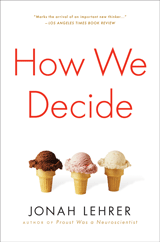One of the hazards of writing a book on decision-making is getting questions about decisions that are far beyond the purview of science (or, at the very least, way beyond my pay grade). Here, for instance, is a question that often arrives in my inbox, or gets shouted out during talks:
"How should we make decisions about whom to marry? If the brain is so smart, why do half of all marriages end in divorce?"
Needless to say, there is no simple answer to this question. (And if I had a half-way decent answer, I'd be writing a book on marriage.) But I've been recently been reading some interesting research on close, interpersonal relationships (much of it by Ellen Berscheid, at the University of Minnesota) and I'm mostly convinced that there's a fundamental mismatch between the emotional state we expect to feel for a potential spouse - we want to "fall wildly in love," experiencing that ecstatic stew of passion, desire, altruism, jealousy, etc - and the emotional state that actually determines a successful marriage over time. Berscheid defines this more important emotion as "companionate love" or "the affection we feel for those with whom our lives are deeply intertwined." Jonathan Haidt, a social psychologist at the University of Virginia, compares this steady emotion which grows over time to its unsteady (but sexier and more cinematic) precursor: "If the metaphor for passionate love is fire, the metaphor for companionate love is vines growing, intertwining, and gradually binding two people together."
What's wrong with seeking passion? Don't we need to experience that dopaminergic surge of early love, in which the entire universe has been reduced to a single person? ("It is the east, and Juliet is the sun.") The only problem with this romantic myth is that passion is temporary. It inevitably decays with time. This is not a knock against passion - this is a basic fact of our nervous system. We adapt to our pleasures; we habituate to delight. In other words, the same thing happens to passionate love that happens to Christmas presents. We're so impossibly happy and then, within a matter of days or weeks or months, we take it all for granted.
I can't help but think that Shakespeare was trying to warn us about the fickleness of passionate love even as he was inventing its literary template. Romeo and Juliet, after all, begins with Romeo in a disconsolate funk. But he's not upset about Juliet. He hasn't even met Juliet. He's miserable over Rosaline. And so, while the rest of the tragedy is an ode to young lovers and impossible passions, Shakespeare has prefaced the action with a warning: passion is erratic. The same randy Romeo who compares you to the sun was in love with someone else last night.
What makes this mismatch even more dangerous is our tendency to confuse physical attractiveness with personal goodness. In a classic 1972 paper, "What is beautiful is good," Berscheid and colleagues demonstrated that we instinctively believe that prettier people "have more socially desirable personality traits" and "lead better lives". Furthermore, this phenomenon works in both directions, so that people who have been "prejudged" to be more or less physically attractive, but don't know they've been judged that way, still behave in a more "friendly, likeable and sociable manner". This suggests that our emphasis on attractiveness, lust and beauty - these are the variables that we associate with passionate love - can actually distort our perception of more important personality variables. Because we'll habituate to those hips, and that sexy smile won't be sexy forever. And then we'll no longer confuse beauty with goodness, or believe that our attractive boyfriend is also really nice.
The point is not that passionate love isn't an important signal. It surely is - that rush of dopamine is trying to tell us something. But a successful marriage has to endure long past the peak of passion. It has survive the rigors of adaptation and intimacy, which are features of romantic relationships that don't get valorized in Hollywood, Bollywood or Shakespeare.







Comments (16)
Yes, we fall in love with being in love..knocking out all common sense feedback we might have ever had. So caught up, we only see what we want to see, until we wake up one day and finally realize we married a pathological lier(or they do). We really want is a feeling that transcends our fear of death.
Posted by: Was Once | March 8, 2010 12:45 PM